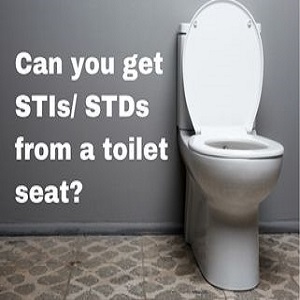Sexually transmitted infections (STIs), also called as sexually transmitted diseases (STDs) are transmitted mainly through sex. Other forms of transmission include mother-to-baby transmission during pregnancy and delivery, through shared needles while injecting drugs, blood transfusions with infected blood, tattooing with non-sterile needles, close skin-to-skin contact with an infected person and so on. Toilet seats though, harbour a lot of bacteria and other micro-organisms but luckily, this is not the route of transmission for STDs/STIs

Bacteria, viruses or parasites that cause STDs need warm and moist environment of the human body tissues to survive and reproduce and do not live outside the body for long. So the possibility of contracting a sexually transmitted infection from a toilet seat is extremely rare. The only possibility of catching an STD from a restroom is if infected semen, blood or other bodily discharges are deposited on the toilet seat and someone immediately sits on it with an open wound, which gets exposed to the infected secretions. Such a scenario is highly unlikely.
STDs caused by bacteria (Syphilis, Gonorrhea and Chlamydia) do not transmit through toilet seats at all as they cannot survive outside the human body. Viral STDs (such as HIV, Herpes, Hepatitis and HPV) can survive outside the body but only for a few seconds to a few minutes and such quick transmission to another person is highly unlikely. Parasitic STDs (such as trichomoniasis and pubic lice) also do not survive on hard surfaces such as toilet seats for a long time and their transmission is also not likely.
Preventive measures for STDs:
Even if not through toilet seats, STD transmissions happen readily and must be avoided under all circumstances. As most STDs spread through intimate sexual contact, following precautions need to be taken to keep the STDs away.
- Use a condom or dental dam for every sexual act.
- Get yourself and your partner tested before indulging in sexual activities
- Avoid sex with multiple partners or with partners whose STD status is not known
- Take Pre-exposure prophylaxis (PrEP) for HIV, if sexually active with multiple partners.
- Do not share needles or sex toys.
Preventive measures for safe toilet use:
Though it is highly improbable to get a sexually transmitted disease from a toilet seat, other bacterial or viral infections particularly urinary or gastro-intestinal infections can be readily transmitted if the restroom is not clean. Thus, taking certain safety measures is always advisable for a stress-free washroom experience.
- Wash hands after each visit to the toilet.
- Avoiding touching door knobs, faucets or other surfaces in the washroom. Using a paper towel or a handkerchief while opening the door.
- Take minimum belongings to the restroom to avoid contamination.
- Do not keep your purse or other belongings on the floor of the restroom.
- Cover the toilet seat with paper or tissues before sitting or sanitise the seat with a disinfecting agent.
Disclaimer: This website may contain general information relating to various medical conditions and their treatment. Such information is provided for informational purposes only and is not meant to be a substitute for the advice provided by a doctor or other qualified healthcare professionals. Readers should not use the information contained herein for diagnosing a health or fitness problem or disease. Readers should always consult with a doctor or other healthcare professional for medical advice or information about diagnosis and treatment.
![]()




